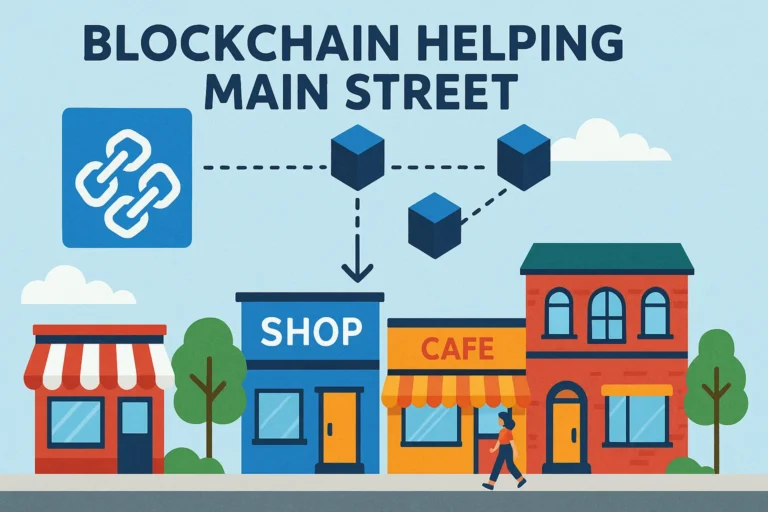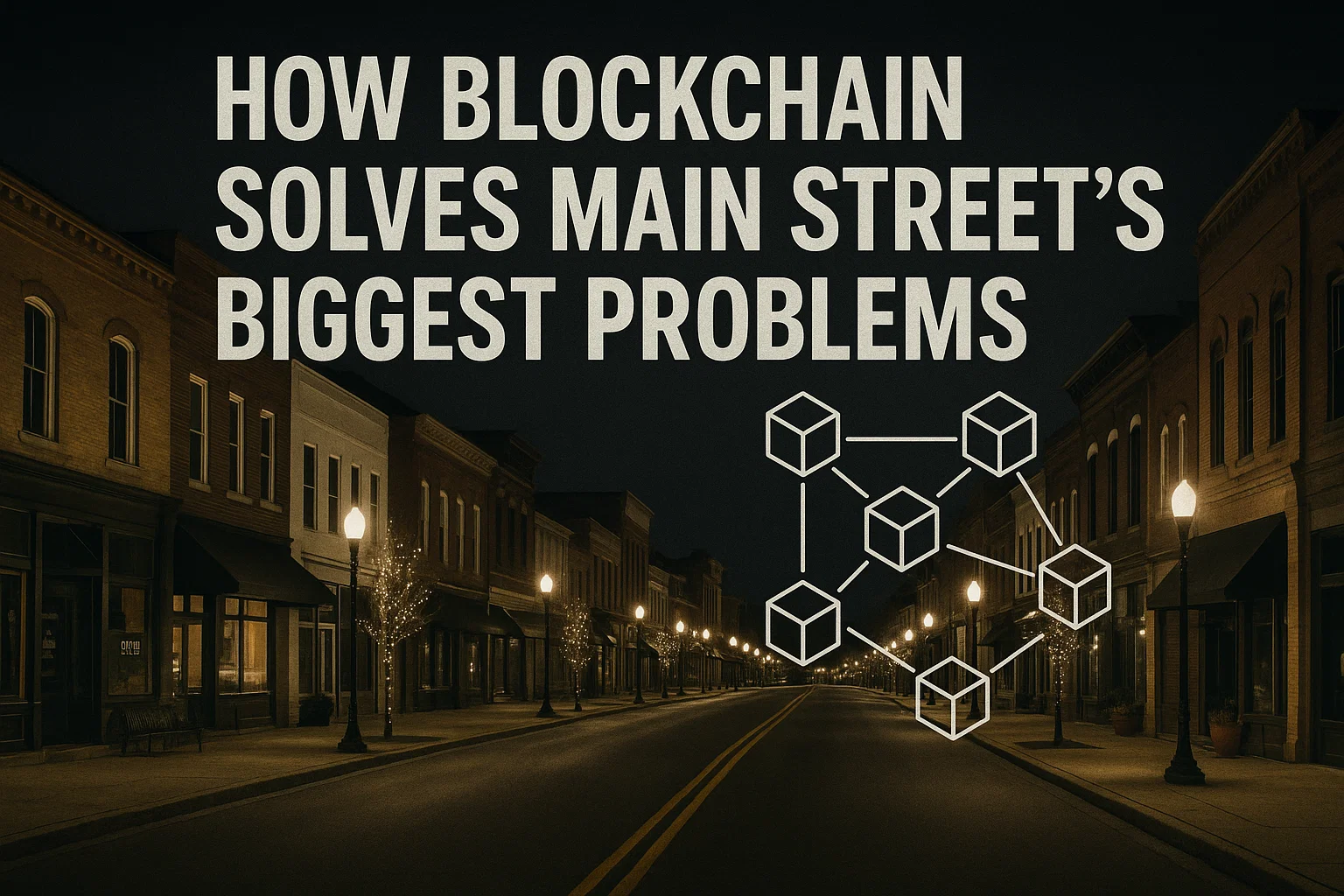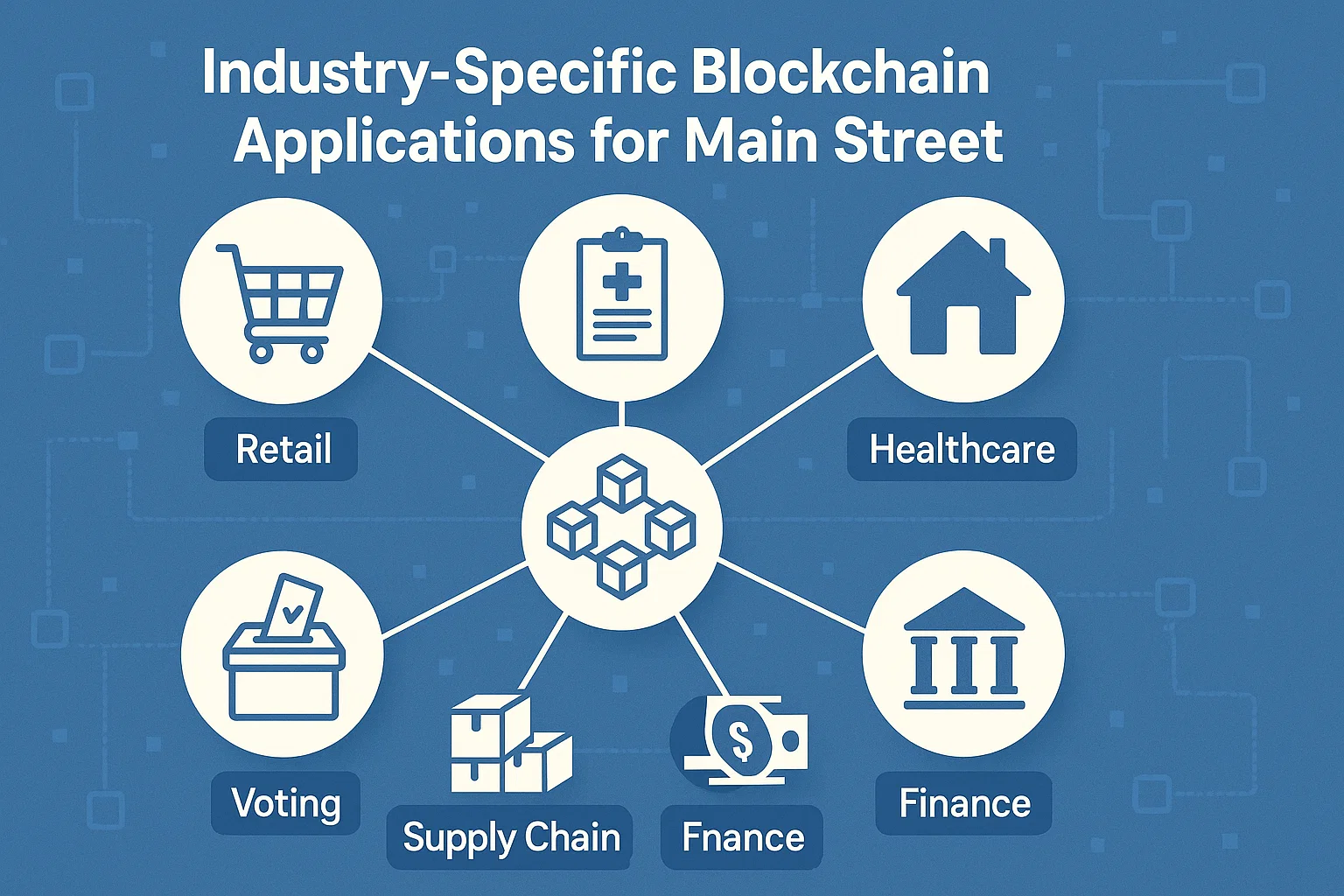When most people hear “blockchain,” they immediately think of Bitcoin roller coasters and cryptocurrency headlines. But while digital currencies dominate the conversation, blockchain helping main street businesses has become one of technology’s best-kept secrets. From the corner bakery to the local hardware store, blockchain technology is revolutionizing how small and medium-sized businesses operate—without requiring a single cryptocurrency transaction. This transformation is happening quietly, efficiently, and profitably across thousands of leading street establishments that have discovered the practical power of decentralized technology beyond the speculation and hype.
The reality is that blockchain helping Main Street represents a fundamental shift in how local businesses manage trust, transparency, and transactions. While Wall Street debates crypto valuations, leading street entrepreneurs are leveraging blockchain to solve real problems for small businesses: verifying product authenticity, streamlining supply chains, reducing payment processing fees, and building customer trust in ways that were impossible just a few years ago.
What Makes Blockchain Perfect for Main Street Business?
Blockchain Beyond Cryptocurrency
Blockchain technology is essentially a digital ledger that records transactions across multiple computers in a way that makes the records nearly impossible to alter retroactively. Think of it as a shared notebook that everyone can read, but no single person controls. This fundamental characteristic makes blockchain compelling for helping Main Street businesses solve everyday operational challenges.
Unlike traditional databases controlled by a single entity, blockchain creates a transparent, tamper-proof record that all authorized parties can access. For main street businesses, this means reduced fraud, lower verification costs, and increased trust with customers and suppliers. The technology doesn’t require businesses to understand complex cryptography or cryptocurrency markets—just the practical benefits of secure, transparent record-keeping.
The Cost Advantage Nobody Talks About
One of the most compelling aspects of blockchain helping leading street establishments is the dramatic reduction in intermediary costs. Traditional business transactions often involve multiple middlemen: payment processors, verification services, banks, and clearinghouses. Each takes a fee, adding up to significant annual expenses for small businesses operating on tight margins.
Blockchain business solutions eliminate many of these intermediaries by enabling direct, verified transactions between parties. A local restaurant using blockchain-based payment systems can reduce credit card processing fees from 3% to less than 1%. For a business processing $500,000 annually, that’s $10,000 saved—money that can be reinvested in staff, inventory, or expansion.
Real-World Applications: Blockchain Helping Main Street Today
Supply Chain Transparency for Local Retailers
Local retailers face constant pressure to verify product authenticity and origin. Customers increasingly want to know where products come from, how they’re made, and whether they’re genuine. Blockchain in retail provides an immutable record of a product’s journey from manufacturer to store shelf.
Consider a local boutique selling artisanal goods. Using blockchain technology applications, each product receives a unique digital identity recorded on the blockchain. Customers can scan a QR code to see the entire product history: who made it, when it was created, its journey through the supply chain, and verification of authenticity. This transparency builds trust and justifies premium pricing for legitimate artisanal products.
Supply chain blockchain implementations have helped leading street retailers reduce counterfeit product issues by up to 90%. For businesses selling high-value items like jewelry, specialty foods, or handcrafted goods, this technology provides a competitive advantage that was previously available only to large corporations with sophisticated tracking systems.
Smart Contracts Simplifying Business Operations
Smart contracts represent another powerful example of blockchain helping Main Street businesses automate routine operations. These self-executing contracts automatically enforce agreement terms when predetermined conditions are met—no lawyers, no paperwork, no delays.
A local property management company can use smart contracts to automate rent collection, maintenance requests, and deposit returns. When a tenant pays rent, the smart contract automatically records the payment, updates the ledger, and triggers a receipt. When a lease ends, the contract automatically initiates the deposit return process based on inspection results.
This automation reduces administrative overhead by 40-60% for small businesses, freeing owners to focus on growth rather than paperwork. The blockchain technology ensures all transactions are recorded transparently, reducing disputes and improving landlord-tenant relationships.
Customer Loyalty Programs That Actually Work
Traditional loyalty programs are expensive to maintain, vulnerable to fraud, and often frustrate customers with complex redemption rules. Blockchain, helping main street businesses create loyalty programs, has revolutionized customer retention strategies for local establishments.
A neighborhood coffee shop can create blockchain-based loyalty tokens that customers earn with each purchase. These tokens are stored in a simple mobile wallet and can be redeemed instantly—no cards to lose, no points that mysteriously disappear, no complicated tracking systems. The blockchain ensures complete transparency: customers can verify their balance anytime, and the business cannot alter records retroactively.
More innovative applications allow multiple local businesses to participate in shared loyalty networks. Your loyalty tokens from the coffee shop might be accepted at the bookstore next door, creating a practical blockchain use scenario that benefits the entire business district and encourages customers to shop local.
How Blockchain Solves Main Street’s Biggest Problems
Fighting Payment Fraud and Chargebacks
Payment fraud costs small businesses billions annually, with chargebacks representing an excruciating problem. When a customer disputes a charge, the business often loses both the product and the payment, and it also incurs additional fees.
Blockchain helps Main Street combat fraud by creating immutable transaction records that definitively prove delivery and receipt. When a customer purchases a product, the transaction is recorded on the blockchain with timestamps, digital signatures, and delivery confirmation. If a chargeback dispute arises, the business has irrefutable evidence of the legitimate transaction.
Local businesses implementing blockchain business solutions for payment processing report a 70-80% reduction in fraudulent chargebacks. The technology creates a transparent audit trail that protects both businesses and honest customers while making it nearly impossible for bad actors to exploit the system.
Streamlining Licensing and Compliance
Small businesses face increasingly complex regulatory requirements, from food safety certifications to professional licenses. Managing these documents, proving compliance, and handling inspections consumes significant time and resources.
Blockchain technology applications in compliance management allow businesses to maintain all licenses, certifications, and inspection records on a shared blockchain accessible to regulators. When a health inspector visits a restaurant, they can instantly verify food handler certifications, supplier credentials, and maintenance records—all cryptographically verified and tamper-proof.
This streamlined approach to compliance reduces administrative burden by approximately 50% while actually improving regulatory compliance. The benefits of decentralized technology include reduced paperwork, faster inspections, and lower legal risks for conscientious business owners.
Building Trust Through Transparency
Modern consumers increasingly value transparency, particularly regarding product sourcing, business practices, and corporate responsibility. By helping main street businesses demonstrate these values, blockchain provides a competitive advantage against both online retailers and larger chains.
A local grocery store can use blockchain in retail to provide complete transparency about produce sourcing. Customers can scan products to see exactly which farm grew their vegetables, when they were harvested, how they were transported, and what pesticides (if any) were used. This level of transparency was previously impossible at a reasonable cost, but it is now accessible to any main street business.
The trust built through blockchain transparency translates directly to customer loyalty and premium pricing power. Studies show consumers will pay 15-20% more for products with verified, transparent supply chains—a significant advantage for local businesses competing with discount chains.
Getting Started: Blockchain for Small Businesses Made Simple
No-Code Blockchain Solutions for Main Street
The biggest misconception about blockchain technology is that it requires programming expertise or technical knowledge. Modern blockchain platforms for small businesses offer user-friendly, no-code solutions specifically designed for non-technical business owners.
These platforms provide simple dashboards where businesses can create loyalty programs, manage supply chain tracking, or implement smart contracts using templates and drag-and-drop interfaces. The underlying blockchain complexity is completely hidden—business owners interact with intuitive tools that feel like familiar business software.
Companies like IBM Food Trust, VeChain, and Shopify’s blockchain features have made blockchain accessible to any business owner who can use basic computer applications, helping Main Street. Setup typically takes hours, not months, and requires minimal upfront investment.
Cost-Effective Implementation Strategies
Implementing blockchain business solutions doesn’t require massive capital investment. Many platforms offer subscription models starting at $50 to $ 200 monthly, making the technology accessible even for minimal operations.
The key is starting small and scaling gradually. A restaurant might begin with a simple blockchain-based loyalty program, then expand to supply chain tracking for key ingredients, and eventually implement smart contracts for supplier agreements. This phased approach allows businesses to learn the technology, demonstrate ROI, and build internal expertise before significant commitments.
Most main street businesses that implement blockchain technology applications achieve a positive ROI within 6-12 months through reduced fees, decreased fraud, improved efficiency, and increased customer loyalty. The business case for practical blockchain uses on Main Street has become overwhelmingly compelling.
Training and Support Resources
The blockchain industry has recognized that helping Main Street succeed requires robust educational resources and support systems. Numerous free and low-cost training programs teach business owners blockchain fundamentals and practical applications.
Local chambers of commerce increasingly offer blockchain workshops tailored explicitly to primary street needs. Online platforms provide step-by-step tutorials for implementing standard blockchain solutions. Industry associations have developed certification programs for blockchain business consultants who specialize in small business implementations.
This growing support infrastructure means main street businesses don’t need to figure out blockchain alone. Expert guidance is readily available, dramatically reducing implementation risks and accelerating time-to-value for blockchain for small businesses.
Industry-Specific Blockchain Applications for Main Street
Restaurants and Food Service
The restaurant industry faces unique challenges, and blockchain helps Main Street eateries provide significant advantages. Food safety, ingredient sourcing, and customer trust are critical success factors that blockchain addresses directly.
Blockchain technology enables restaurants to provide complete ingredient traceability, which is increasingly important as food allergies and dietary restrictions become more common. Customers with severe allergies can verify ingredients and potential cross-contamination risks by accessing blockchain records. This transparency reduces liability while building trust.
Additionally, restaurants using supply chain blockchain can verify supplier claims about organic certification, sustainable fishing practices, or humane animal treatment. These verifications allow restaurants to confidently promote their ethical sourcing, attracting customers willing to pay premium prices for aligned values.
Retail and Specialty Stores
Local retailers competing with online giants need every advantage. Blockchain in retail provides leading street stores with tools that were once available only to corporate chains with massive IT budgets.
Product authentication represents a critical application. Specialty retailers selling collectibles, luxury goods, or artisanal products can use blockchain to provide verifiable authenticity certificates. Each item receives a unique blockchain identifier that proves its provenance and authenticity, dramatically reducing counterfeit concerns.
Inventory management also benefits from blockchain technology applications. Retailers can track product movement with unprecedented accuracy, reducing shrinkage, improving reorder timing, and minimizing stockouts of popular items.
Professional Services
Accountants, lawyers, consultants, and other professional service providers help professionals streamline operations and improve client service.
Document verification and storage on blockchain ensure tamper-proof records of contracts, agreements, and sensitive information. Legal documents stored on blockchain are cryptographically verified, timestamped, and unchangeable, providing a level of certainty that traditional document storage cannot match.
Professional services firms also use smart contracts to automate billing, milestone payments, and scope-of-work agreements. These automated systems reduce administrative overhead while ensuring complete transparency with clients—building trust and reducing payment disputes.
Healthcare and Wellness
Local healthcare providers, pharmacies, and wellness centers face strict regulatory requirements and privacy concerns. Blockchain business solutions tailored for healthcare enable secure, compliant record-keeping that protects patient privacy while improving care coordination.
Patient records stored on blockchain remain completely private but can be selectively shared with authorized providers. This approach solves the interoperability problem that plagues healthcare while maintaining HIPAA compliance. Patients control their own data, choosing exactly what information to share with which providers.
Pharmacies use blockchain technology to combat prescription fraud and ensure medication authenticity. Each prescription is recorded on blockchain, making duplicate prescriptions impossible and helping identify potential drug interactions or doctor shopping behaviors.
The Future of Blockchain on Main Street
Emerging Trends and Innovations
Blockchain’s role in helping Main Street businesses continues to evolve rapidly, with new applications emerging constantly. Artificial intelligence integration with blockchain creates powerful tools for predictive inventory management, dynamic pricing, and personalized customer experiences.
Internet of Things (IoT) devices connected to blockchain enable automated supply chain tracking, equipment maintenance scheduling, and energy management. A bakery might use IoT sensors recording temperature and humidity data on blockchain, providing automatic compliance documentation for health inspections.
Decentralized finance (DeFi) applications are being adapted for primary street needs, enabling peer-to-peer lending, alternative financing options, and innovative payment systems that bypass traditional banking infrastructure entirely.
Community-Building Through Blockchain
Perhaps the most exciting frontier for blockchain for small businesses involves community building and local economic development. Neighborhood business districts are creating shared blockchain networks that benefit all local merchants.
These community blockchain networks enable shared loyalty programs, collaborative marketing campaigns, and collective purchasing power. Local businesses can compete more effectively against chains by pooling resources and creating seamless customer experiences across multiple establishments.
Some communities are even experimenting with local blockchain-based currencies designed to encourage spending within the community. These practical blockchain uses strengthen local economies by incentivizing residents to shop Main Street rather than online or at chain stores.
Regulatory Developments Supporting Main Street Blockchain
Government agencies increasingly recognize blockchain as a tool for helping Main Street businesses strengthen local economies and have begun developing supportive regulatory frameworks. Small business grants and tax incentives for blockchain adoption are emerging at the federal, state, and local levels.
Regulatory clarity around blockchain technology applications continues improving, reducing legal uncertainty that previously deterred small business adoption. Simplified compliance requirements for small-scale blockchain implementations make the technology more accessible without sacrificing consumer protections.
This supportive regulatory environment, combined with decreasing implementation costs and increasing user-friendliness, positions blockchain to help Main Street achieve explosive growth over the next decade.
Overcoming Common Concerns and Misconceptions
“Blockchain Is Too Complex for My Business”
This misconception represents the most significant barrier to the adoption of blockchain by small businesses. Modern blockchain platforms are designed specifically for non-technical users, with interfaces as simple as social media or email.
Business owners don’t need to understand blockchain’s technical details any more than they need to understand TCP/IP protocols to use email. The platforms handle all complexity behind user-friendly dashboards focused on business outcomes, not technical specifications.
Training requirements are minimal—most business owners become comfortable with basic blockchain business solutions within a few hours of hands-on practice.
“Blockchain Is Only for Big Companies”
While large corporations were early blockchain adopters, the technology has been democratized. Blockchain is helping main street businesses become more cost-effective than many traditional business systems.
Small businesses often benefit more from blockchain than large enterprises because they operate on tighter margins, where efficiency improvements and cost reductions have a proportional impact—the ability to compete on transparency and trust levels the playing field against bigger competitors.
“The Energy Consumption Concerns Me”
Early blockchain implementations, particularly Bitcoin, required enormous energy consumption. However, modern blockchain technology applications for business use efficient consensus mechanisms requiring minimal energy—often less than traditional database systems.
Most business-focused blockchain platforms use “proof of stake” or similar efficient protocols that consume negligible energy. A restaurant running a blockchain loyalty program uses less electricity than its point-of-sale system.
“My Customers Won’t Understand or Care”
Customers don’t need to understand blockchain technology to benefit from it. They experience better service: loyalty programs that work seamlessly, products with verifiable authenticity, transparent pricing, and trusted product information.
Blockchain helping Main Street creates better customer experiences, which customers absolutely notice and appreciate—even if they don’t understand the underlying technology. It’s like using a smartphone: users enjoy the benefits without understanding the technical implementation.
Measuring Success: ROI of Blockchain Implementation
Quantifiable Benefits for Main Street Businesses
Businesses implementing blockchain technology report measurable improvements across multiple metrics. Payment processing costs typically decrease 40-60%, saving thousands of dollars annually even for small operations.
Fraud and chargeback losses decrease by 70-80%, protecting revenue and reducing administrative time spent on disputes. Inventory accuracy improves by 30-50%, reducing both stockouts and overstock situations.
Customer loyalty program participation rates increase 2-3x compared to traditional programs, significantly driving repeat business and increasing customer lifetime value.
Intangible Value Creation
Beyond quantifiable metrics, blockchain helps Main Street create substantial intangible value. Brand reputation improves as businesses demonstrate transparency and ethical practices. Customer trust deepens, creating competitive moats that protect against price-based competition.
Employee satisfaction often increases as blockchain automation eliminates tedious administrative tasks, allowing staff to focus on customer service and more rewarding work. This improved job satisfaction reduces turnover, lowering recruitment and training costs.
Community standing improves as businesses leading blockchain adoption position themselves as innovative and forward-thinking, attracting both customers and quality employees.
Conclusion
The quiet revolution of blockchain, helping Main Street businesses transform their operations, has reached a tipping point. What began as niche experimentation has become a mainstream business strategy delivering concrete results for thousands of local establishments.
The cryptocurrency hype cycle distracted many from blockchain’s fundamental value proposition: solving business problems through transparency, efficiency, and trust. Main street businesses implementing blockchain technology today gain significant competitive advantages while building more resilient, efficient operations for the future.



